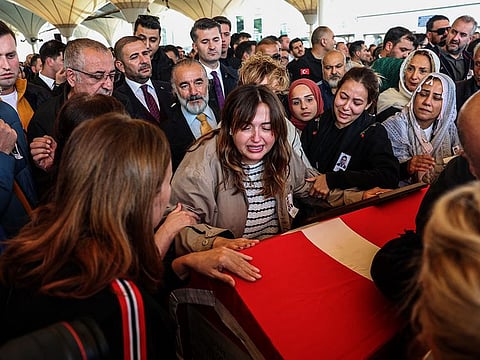After attack, Turkey bombs PKK, buries dead
Attack occurred amid growing signs of political thaw between Ankara and Kurdish leaders

Istanbul: The first Ankara attack victims were to be buried Thursday, hours after Turkey struck PKK militants in Iraq after blaming them for the assault on a defence firm that killed five.
Hours after Wednesday’s deadly attack on the state-run Turkish Aerospace Industries (TAI) that also left 22 injured, several critically, Turkey pointed the finger at Kurdish militants, saying they were “very likely” responsible.
Two attackers were killed in the assault, with new CCTV images from the site posted on X distinctly showing two young people, a woman and a man, getting out of a taxi, assault rifles in hand, and opening fire before entering the building.
The taxi driver was killed by the pair who stole his taxi, officials said. He was to be buried on Thursday.
In response, the Turkish military staged a string of overnight attacks on Kurdish militant positions in Syria and northern Iraq, destroying “32 targets belonging to the terrorists”, a defence ministry statement said.
President Recep Tayyip Erdogan, who was in Russia at the time of the attack for talks with Vladimir Putin, will join the BRICS summit of major emerging economy nations “before returning to Ankara”, his office told AFP.
The attack occurred amid growing signs of a political thaw between Ankara and Kurdish leaders, with PKK leader Adbullah Ocalan - who has been jailed in solitary confinement since 1999 - on Wednesday receiving his first family visit in years.
First family visit since 2020
Ocalan’s nephew, Omer Ocalan, who is a lawmaker for the main pro-Kurdish DEM party, confirmed the meeting on X.
“Our last face-to-face meeting with Abdullah Ocalan was on March 3, 2020,” he wrote, saying the family met him again “years later on October 23, 2024”.
During the two-hour meeting, “Ocalan said he was ready to lay down his arms”, Abdulkadir Selvi, a leading columnist with the Hurriyet daily which is close to the government, wrote on Thursday.
The family had last requested a visit in August, the paper said.
Previously the last contact they had with him was a brief phonecall in March 2021.
The visit came a day after Devlet Bahceli, head of the far-right MHP, which is fiercely hostile to the PKK and belongs to Erdogan’s ruling coalition, invited Ocalan to parliament to renounce terror and dissolve his movement.
Following the attack, DEM, which is the third largest party in parliament, issued a statement condemning the violence but saying it was “noteworthy” that it happened “just as Turkish society was talking about a solution and the possibility of dialogue”.
Arrested on February 15, 1999 in the Kenyan capital Nairobi following a Hollywood-style operation by Turkish security forces after years on the run, Ocalan was brought to Turkey for trial and sentenced to death.
He escaped the gallows when Turkey abolished capital punishment in 2004 but has since spent his remaining years in an isolation cell on Imrali prison island in the Sea of Marmara, south of Istanbul.
Now 75, the former guerrilla is seen as a hero by many Kurds, who call him “Apo” - Kurdish for “uncle”.
He founded the PKK in 1978 which went on to spearhead a brutal insurgency that has killed tens of thousands in its fight for independence.
He first called for dialogue and a ceasefire in 2012 and again in 2013, before the bloody conflict resumed with a vengeance in 2015 in the southeastern city of Diyarbakir, which is predominantly Kurdish.
Following these clashes, which left hundreds of Kurds dead, the militants retreated to the mountains on the borders of Syria and Iraq.


